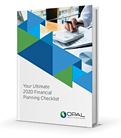Financial Planning for Small Business Owners
By Lee Korn | June 28, 2019There are some common characteristics shared by all successful small business owners. They’re a driven, self-motivated bunch who aren’t afraid to think differently and take risks—and the payoff can certainly be worth it.
Of course, this requires careful planning and intention. Case in point: At the end of the day, a business is private stock, which means that it comes into play when planning your overall asset allocation. Designing a portfolio as a business owner, in other words, is a different ball game than it is for non-business owners. It’s one of the many nuances to consider.

What sets a successful small business owner apart is their ability to think ahead and plan accordingly. In business as in life, we can’t predict everything, but sound financial planning puts us in the best position for growth and success over the long term. It helps weave the safety net that will continue to catch you, even if you’re an established entrepreneur with a thriving business.
Planning for Cash Flow
Having grown millions in assets is evidence enough that you’re doing something right as a small business owner. But the challenge for many then becomes unlocking cash flow; something that can be tricky if the majority of your net worth is tied up in your business.
This is where data-driven, quantitative sales forecasting comes in. Your business’s past performance and revenue is usually a solid place to start. You can also look to industry trends to help predict future sales. If you’ve been in business for several years, you probably have a feel for which months are lean and which months are booming.
Use this knowledge to your advantage and plan your budget accordingly. Just like when managing your personal finances, setting aside an emergency fund of liquid cash reserves can help see you through a tough spot.
The optimal amount of cash to hold really depends on how long the business could sustain itself in the event of a cash flow shortage. Speculate how long your business could stay afloat while cash flow negative, then map out a worst-case scenario for each of those months and add them up. The total should give you a good idea of how much cash to hold.
Planning for Taxes
Some small business owners feel confident taking a do-it-yourself approach to tax planning. Others, especially those who are strapped for time, would rather outsource the task to a qualified CPA. There are some major benefits to the latter.
A certified public accountant knows the latest tax laws in and out, which were recently overhauled. And they can advise you yearlong—not just at tax time—regarding how much you should be paying in estimated taxes each quarter and which qualifying business expenses are tax deductible.
Finding legitimate deductions is another factor that can greatly reduce your tax liability. The tax code is a complicated beast, and not having a tax plan in place can majorly derail even the most successful small business owners. Ultimately paying more than you legally have to, or worse, being slapped with an unexpected tax bill, is a surefire way to disrupt your business growth.
Planning for Risk Management
Properly assessing, preparing for, and responding to internal and external risks is part of running a small business. It’s impossible to identify every potential risk that’s out there—and obsessing over it may actually spur an unreasonable amount of fear that hurts revenue growth—but you can make a levelheaded plan that addresses potential risk factors that are in your control.
The Small Business Administration breaks it down this way, offering up additional resources for creating a customized risk management plan.
- Identifying risks and the external and internal factors that affect them
- Pinpointing situations that may create risk for your business
- Being alert of warning signs of risk
- Implementing, monitoring and evaluating a risk management plan for your business
Planning for Retirement
Retirement planning is much more straightforward for folks who work traditional 9-to-5 jobs. Tax-advantaged 401(k) contributions are the norm, and many even throw in an employer match to boot. Things aren’t as cut-and-dry for self-employed people, who often have to take a more hands-on approach to retirement planning. When you’re your own boss, padding your nest egg ultimately falls on your shoulders.
That certainly doesn’t mean it has to be difficult or complicated. An experienced financial advisor can help clarify your options and create an actionable retirement-prep plan. A traditional IRA, Roth IRA or SEP IRA are all tax-friendly options on the table.
Planning for Your Estate
Estate planning is something we all need to think about, but it’s particularly important for small business owners. If the unexpected occurs, what will happen to your business after you’re gone? Your estate will be on the hook for what’s called death tax, which is due nine months after your passing and could be equal to up to 50 percent of your business’s value. Sometimes, selling the business, often for less than it’s worth, is the only way to foot the bill.
Proper estate planning can help minimize taxes and also put preventative measures in place so that owners and shareholders will have an action plan to call on if one of them passes away. A knowledgeable financial planner can put you on the right path.
Planning to Exit the Business
Another thing on the radar is what to do if you’re thinking about exiting the business—more specifically, planning for such a large liquidity event. Do you have a plan for how you’ll leave during a period of growth? Is your management team able to function smoothly without you, or do you need to invest in hiring new talent?
Attracting worthy buyers is the other element at play. Our simple Business Valuation Tool is a great jumping-off point.
Creating customized financial plans for small business owners is part of what we do. At Opal Wealth Advisors, we take the intimidation factor out of the equation, replacing it with sound financial advice and actionable steps to help entrepreneurs feel confident every step of the way. We design in-depth, personalized strategizes that optimize performance and set the stage for long-term growth for your small business.
Be a Smart Investor
Stay up-to-date with industry-leading information and news delivered straight to your inbox.
Get our timely insights delivered to your inbox (Blog)
Please remember that past performance may not be indicative of future results. Different types of investments involve varying degrees of risk, and there can be no assurance that the future performance of any specific investment, investment strategy, or product (including the investments and/or investment strategies recommended or undertaken by Opal Wealth Advisors, LLC [“OWA]), or any non-investment related content, made reference to directly or indirectly in this commentary will be profitable, equal any corresponding indicated historical performance level(s), be suitable for your portfolio or individual situation, or prove successful. Due to various factors, including changing market conditions and/or applicable laws, the content may no longer be reflective of current opinions or positions. Moreover, you should not assume that any discussion or information contained in this commentary serves as the receipt of, or as a substitute for, personalized investment advice from OWA. OWA is neither a law firm, nor a certified public accounting firm, and no portion of the commentary content should be construed as legal or accounting advice. A copy of the OWA’s current written disclosure Brochure discussing our advisory services and fees continues to remain available upon request or at www.opalwealthadvisors.com. Please Remember: If you are a OWA client, please contact OWA, in writing, if there are any changes in your personal/financial situation or investment objectives for the purpose of reviewing/evaluating/revising our previous recommendations and/or services, or if you would like to impose, add, or to modify any reasonable restrictions to our investment advisory services. Unless, and until, you notify us, in writing, to the contrary, we shall continue to provide services as we do currently. Please Also Remember to advise us if you have not been receiving account statements (at least quarterly) from the account custodian.



